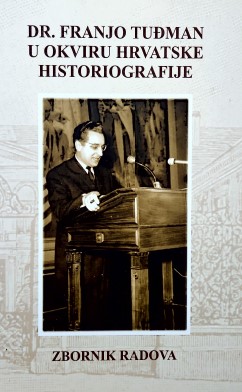SUKOB VLADIMIRA BAKARIĆA I FRANJE TUĐMANA 1961.-1967.
VLADIMIR BAKARIĆ’S DISAGREEMENTS WITH FRANJO TUĐMAN 1961-1967
Author(s): Dino Mujadžević
Subject(s): Political history, Government/Political systems, Political behavior, Comparative politics, Nationalism Studies, Post-War period (1950 - 1989), History of Communism
Published by: Hrvatski institut za povijest
Keywords: Franjo Tuđman; Vladimir Bakarić; League of Communists of Croatia; socialism; Croatian nationalism; Institute for the History of the Workers’ Movement; historiography;
Summary/Abstract: Vladimir Bakarić was at the helm of the Communist Party of Croatia and the League of Communists of Croatia since September 1944. The function, combined with the fact that he was one of Yugoslav president Josip Broz Tito’s most trusted men, made him the person of highest authority and the personification of the communist regime in Croatia. Some authors feel he had very skillfully walked the tightrope between loyalty to Yugoslavia and the efforts to protect Croatia’s interests, between Marxist dogmatism and relative liberalism. He supported Franjo Tuđman’s struggles for the affirmation of the Croatian Partisan movement in The Military Encyclopedia in Belgrade as early as in the 1950s, and in 1961 he arranged for Tuđman to be moved to Zagreb and appointed the director of the Institute for the History of the Workers’ Movement. Bakarić supported Tuđman’s efforts as a counterbalance to Belgrade’s centralist and unitarianist ambitions, but still judged that Tuđman had veered from the «line» of the League of Communists of Croatia in his comments about The History of the League of Communists of Yugoslavia in 1964, having started to advocate nationalist ideas. He was particularly troubled by Tuđman’s favorable disposition toward the Cvetković-Maček agreement of 1939, which Tuđman proclaimed to have practically solved «the Croatian question». Bakarić felt that the politics of the Croatian Peasants’ Party (HSS) and their allies at the Court in the eve of World War II not only had not solved the Croatian question, but had also brought Yugoslavia closer to the Axis Powers and had sabotaged the Partisan uprising. Bakarić attacked Tuđman fiercely at the meeting of the Commission for History of the Central Committee of the League of Communists of Yugoslavia in the spring, but Tuđman would not be dissuaded; he even managed to secure the support of several high-ranking officials of the League of Communists. After Tuđman promoted his ideas in a number of lectures he delivered in 1964 and 1965, Bakarić opened up Party investigation against him, and Tuđman quieted down for the moment without suffering any consequences. Bakarić had him removed from the helm of the Institute only in 1967 when he set out to eradicate «nationalism» from Croatian cultural institutions after the publication of The Declaration on the Status and Name of the Croatian Literary Language.
- Page Range: 361-369
- Page Count: 9
- Publication Year: 2011
- Language: Croatian
- Content File-PDF

